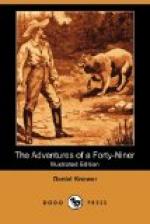danger they were in. It seems to me that I hear
now the oaths of the captain of the other vessel rising
above the sounds of the terrific hurricane as he was
ordering his men, for they, too, were in danger if
they collided with us. Of course, he was on the
bare poles. As he came on us the eighth time
they hoisted their jib sail. As the wind struck
it, it seemed to lift their vessel out of the water,
and, thank God, we were freed from it. It was
forty-five years ago, and, as I write, it all lives
before me as visible as if it were yesterday.
The captain of the other vessel had seen our light,
and, supposing we were in the right channel, had followed
us. We had escaped what seemed almost certain
death, but were not out of danger. Our new good
chain was attached to our bad chain, and the captain
had let out all our chain to free us from the other
vessel, so we were actually hanging by our bad chain
in the open roadstead, not in the protection of a
harbor, and liable to drag our anchor or break our
chain and be wrecked; but we could do nothing more
than submit to our fate. I thought I would get
into my berth and try and get to sleep, and, if I
found myself alive in the morning, we might be saved.
I did sleep, and when I awoke it was daylight.
The gale was subsiding. We had dragged our anchor.
The bow of our brig was very sharp; the banks were
soft mud, and we had struck it with such force that
we were wedged in. The tide was low and we were
almost out of water. We fortunately had struck
the land with our bow, and that was what saved us.
If we had struck with the side of the vessel we would
have been wrecked. So, ever since we had been
freed from the other vessel, we had been in safety
and did not know it. We waited for the tide to
rise and then got our kedge anchor out and pulled the
vessel out off the bank as the tide rose. The
sea was very rough, but the gale had subsided, and
by 11 o’clock we were entering the mouth of the
San Joaquin river in safety. It was forty miles
up the river to Stockton. The river was in a
valley of Tullieries. The land seemed to be in
the course of formation. There was but one tree
between the mouth and Stockton, a willow, called the
Lone Tree. The only place on its banks where
the soil had formed solid enough to produce one, surrounded
by hills at that season of the year, covered with
beautiful wild flowers. The scenery was magnificent.
As the river curved we could see the white sails of
other vessels. They looked as if they were in
a field. You could not see the water at a little
distance, the river being narrow. We could almost
jump from our deck to the banks. We felt in perfect
safety. Contrasting that with the night before
in that terrible hurricane and in the death struggles
for our lives, it produced a supreme feeling of ethereal
ideal happiness that this earth seemed almost a Paradise.
The captain informed me that there was one place on
the river where we might have to anchor. It was




